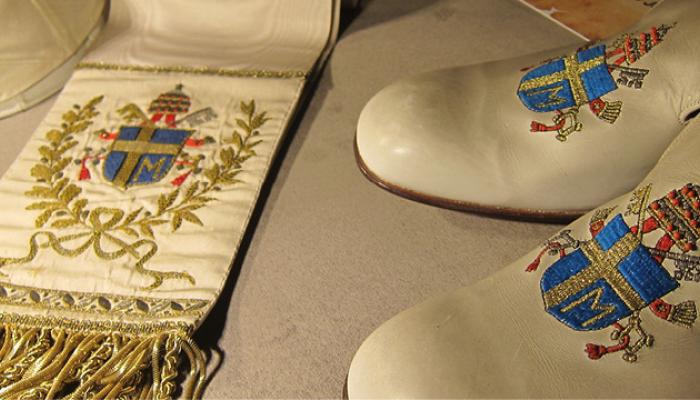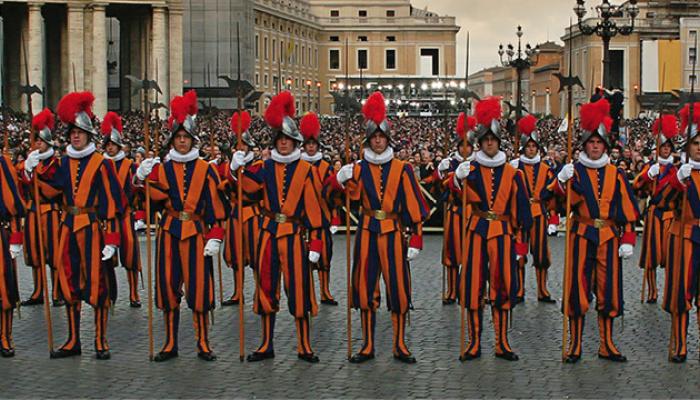
2.9 Quels sont les différents ordres de moines, de religieuses et de religieux ?
Les religieux (frères) et religieuses (sœurs) sont des personnes qui ont choisi de se dédier eux-mêmes et toute leur vie et leurs biens à Dieu, et de ne vivre que par lui. Ils vivent selon une règle (monastique) et travaillent à l’intérieur ou à l’extérieur de leur couvent ou monastère.
Nous pouvons citer en exemple les Missionnaires de la Charité (la congrégation créée par Mère Teresa), les Franciscains, les Jésuites et les Clarisses. Chacune de ces communautés a une organisation différente. Certaines mettent l’accent sur la prière, d’autres travaillent dans des écoles ou des hôpitaux, ou ont d’autres tâches.
How are the people of God formed?
Among the faithful by divine institution there exist sacred ministers who have received the sacrament of Holy Orders and who form the hierarchy of the Church. The other members of the Church are called the laity. In both the hierarchy and the laity there are certain of the faithful who are consecrated in a special manner to God by the profession of the evangelical counsels: chastity or celibacy, poverty, and obedience. [CCCC 178]
What is the consecrated life?
The consecrated life is a state of life recognized by the Church. It is a free response to a special call from Christ by which those consecrated give themselves completely to God and strive for the perfection of charity moved by the Holy Spirit. This consecration is characterized by the practice of the evangelical counsels. [CCCC 192]
What can the consecrated life give to the mission of the Church?
The consecrated life participates in the mission of the Church by means of a complete dedication to Christ and to one’s brothers and sisters witnessing to the hope of the heavenly Kingdom. [CCCC 193]
How is the one, holy, catholic, and apostolic Church structured?
In the Church there are the laity and clerics (clergy). As children of God, they are of equal dignity. They have equally importance but different tasks. The mission of the laity is to direct the whole world toward the kingdom of God. In addition, there are the ordained ministers (clerics), who have the duties of ecclesiastical governance, teaching, and sanctification. In both states of life, there are Christians who place themselves at God’s disposal in a special way through celibacy, poverty, and obedience (for example, consecrated religious).
Every Christian has the duty to bear witness to the Gospel by his own life. But God walks a special path with each person. Some he sends as laymen, so that they might build up the kingdom of God by their family and occupation in the midst of the world. For this purpose, he bestows on them in Baptism and Confirmation all the necessary gifts of the Holy Spirit. Others he entrusts with the pastoral ministry; they are to govern, teach, and sanctify his people. No one can take this duty upon himself; the lord himself must send him on his way with his divine power through Holy Orders, so that he can act in the place of Christ and administer the sacraments. [Youcat 138]
Why does Jesus want there to be Christians who live their whole lives in poverty, unmarried chastity, and obedience?
God is love. He longs for our love also. One form of loving surrender to God is to live as Jesus did—poor, chaste, and obedient. Someone who lives in this way has head, heart, and hands free for God and neighbor.
In every age individual Christians let themselves be completely taken over by Jesus, so that “for the sake of the kingdom of heaven” (Mt 19:12) they give everything away for God—even such wonderful gifts as their own property, self-determination, and married love. This life according to the evangelical counsels in poverty, chastity, and obedience shows all Christians that the world is not everything. Only an encounter with the divine Bridegroom “face to face” will ultimately make a person happy. [Youcat 145]
From the beginnings of monasticism to the “new communities” of our own time, every form of consecrated life has been born of the Spirit’s call to follow Jesus as the Gospel teaches. For the various founders and foundresses, the Gospel was the absolute rule, whereas every other rule was meant merely to be an expression of the Gospel and a means of living the Gospel to the full... Their vows were intended as a concrete expression of this passionate love. [Pope Francis, Letter to consecrated people, 21 Nov. 2014]





